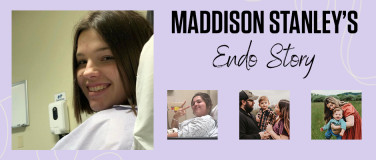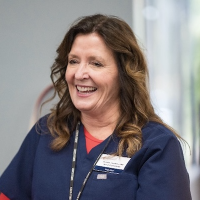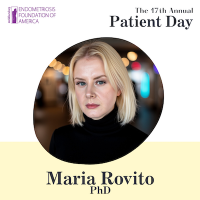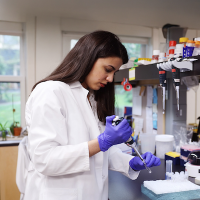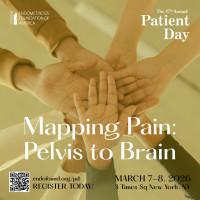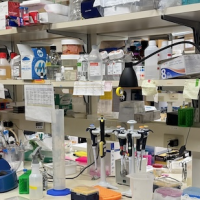
I was 24 when the anesthesiologist put me under, but the pain started when I was 14.
At 14, I had never even had my first date. I loved school, spent my free time writing fiction, and dreamed about one day walking the cobblestone streets of Edinburgh with the castle looming ahead. The excuses doctors gave to explain my pain throughout the following decade wouldn’t have fit my image back then. Imagine telling that little girl who had yet to even kiss someone that the constant aching in her pelvic area was symptomatic of a not using enough lube, a UTI, or having sex with “too large of a penis.”
My college years are marked by dozens of trips to the Student Health Center, each of which ended with a prescription for some antibiotic and a pat on the back. I rested easy believing those doctors were doing their best with my vague symptoms, and I accepted that even though the urine and blood tests never indicated infection, antibiotics were doing me some good. I can’t count the times I was told, “It’s so complicated in that area of the body. It’s really hard to know what’s going on in there.”
At 20, I had my first trip to the emergency room, an ill-fated night when I awoke slick with sweat and wracked with the sensation of a whole set of kitchen knives inside my pelvis. When I found myself on a gurney looking up at a very tired doctor in navy scrubs, his knitted brows told me everything I needed to know before he opened his mouth.
“Your urine test came back normal. You don’t have a UTI, and you’re not pregnant.” He scratched his forehead to show me how vexing this whole situation was. “I’m going to put in a referral to one of our gynecologists to follow up. Unless you want us to do an ultrasound, I suggest you head home and take some Advil for the cramps.”
The word “ultrasound” was ultra-terrifying to me, a college kid without insurance. I declined that particular procedure and went home, missing class the next day due to the physical inability to walk there. Still, I hadn’t yet seen reason to mistrust the legion of doctors and nurses who insisted that my pain was just due to period pains.
I did everything I could think of to minimize the pain. I went vegan, stopped eating gluten, prioritized long walks and meditation. I saw that gynecologist the tired doctor referred me to and held onto her assurance that everything looked normal. I moved forward with life as best I could and moved to Portland, Oregon, dying to get out of my small college town and find a job that could provide me with benefits.
After continuous pain for years, one night changed everything. I’d recently moved back to my college town with my then-fiancé right before we broke up, so I was alone and in the very place I’d run away from. As I lay in my dark bedroom, unable to even pull myself into a seated position, I thought about the doctors I’d seen over the years in that small town. If I went to that ER again, I would hear all the same excuses.
The knives had finally broken through the layers of muscle and skin, and it felt like I was being serrated from the inside out. The sensation soon spread to my back and my breasts, holding me in a vice grip that neither lying down nor sitting up could help. I tried to shower but vomited from the pain and wound up finally falling asleep covered with a towel on the floor of my bathroom.
Twelve hours later, I called my mother in California. “Go to the emergency room,” she told me. I hadn’t shed a single tear the whole night, but hearing those instructions triggered something in me. I imagined the disbelieving looks and myriad of excuses I would receive this time around mourned the composure I wished I could have.
An hour later, I was back in a hospital gurney in the same ER as a few years earlier. The nurse asked me for a number to describe my pain. I said six and then worried she would think I sounded dramatic. She promised to bring me some pain medicine while I waited for the doctor, but another 45 minutes went by before I saw that nurse again.
Finally, worn out and numb to the goings-on around me, I agreed to an ultrasound and a pelvic exam; certain they wouldn’t reveal anything. But within fifteen minutes, everything shifted. A nurse pumped me full of pain meds and a doctor stood by my bedside. “The ultrasound revealed that you have a torsed ovary,” she told me. “I'm going to perform surgery to un-torse it.”
“What’s a torsed ovary?” I managed to ask.
“It’s when an ovary twists on itself, usually due to the weight of a cyst.” She watched me, waiting for some comprehension, but I could scarcely believe she’d said “surgery.” “There’s a 5 percent chance I’ll have to remove the ovary, but that’s really uncommon. I haven’t done one of those in years.”
I accepted the clipboard of forms needed to consent to the procedure in disbelief. An anesthesiologist entered, tanned and at ease like he’d just left Mar a Lago, and asked if I’d ever “been under” before. I shook my head as he wheeled me into the operating room. The last thing I can remember is apologizing for the awkwardness of the whole situation, wondering if they’d care about my unshaven vagina.
When I awoke in the recovery room, I saw a new nurse by my side. “Hi there,” she said with maternal tenderness. “I need to let you know that they did have to take the ovary out, but don’t worry - you’ll still be able to have babies."
I stared up at her, the room around me fading away. The surgeon had taken my right ovary away. She’d promised there was only a 5 percent chance of that. She hadn’t done the operation in years. I started to cry.
My mother flew to Oregon to be with me, but I wasn’t able to do much for the next few days besides stare at the gashes in my stomach. The surgeon had gone in through my belly button, so it was sliced in half and now looked more like a bruised football than part of my body. Then there was a tiny incision on my right side, a dainty reminder of the gaping hole inside me.
My mother took me to my follow-up appointment, where the doctor explained that when they’d opened me up, they saw that my right ovary was too far gone to save. My mother asked if the same thing could happen to my left ovary. The doctor told us the odds were low.
“Like the odds of having to remove my ovary?” I asked. “Why did this happen in the first place? Why am I in pain all the time?”
The doctor gave me a long look. “I’m not sure. I’d have to do an exam. You can come back in a couple of weeks for that.”
On my way out the door, I asked her if I could have a glass of champagne at my cousin’s wedding, which I was supposed to attend the following day. “I would,” she quipped. “You don’t want people to think you’re pregnant.”
My lack of trust in the medical community defined my subsequent appointments with other providers, and I resisted their assumptions that I was now cured of all ailments because that pesky ovary was gone. I got comfortable listing all of my symptoms - bloating, chronic searing pain, nausea, crippling fatigue - over and over, and then finally I heard the words that changed my life: “All of your symptoms really sound like endometriosis.”
That provider told me the surgeon should have seen evidence of endo during the surgery, so I texted the surgeon as soon as I got home. Her reply came swiftly: “I didn’t see anything, but it was hard to tell.”
It has always been difficult for doctors to tell what was wrong with me, so I decided to do the work on my own. I requested every record from every doctor’s office I’d ever been to, piecing together the medical puzzle no one else had bothered to take out of the box. Regardless of where I went or what doctor I’d seen, they’d all made the same note: “Patient is pleasant and well-groomed.”
I promised myself that I wouldn’t be “pleasant” in a doctor’s office again. “Pleasant” is for your grandparent’s house, or a date, or a parent-teacher conference. “Pleasant” is not for advocating for your own health and wellness, and certainly not for dealing with the aftermath of a decade of misdiagnosis.
I consulted a new doctor in Portland who listened carefully to every word I said and then talked it over with a medical student. Within the time span of our initial appointment, she diagnosed me with pelvic myalgia and endometriosis, and being able to put words to the pain was the best gift I’ve ever received.
I recognize the privilege that I’ve had throughout my health journey. I have access to doctors, the time necessary to go to appointments, the ability to take off of work. I’m a white, cisgender woman and have never had to carry the burdens that POC patients and trans/gender-fluid patients experience in the doctor’s office. I’m lucky that I have health insurance now to cover the costs of my future treatment, as so many people suffering in this country don’t.
And I still wasn’t diagnosed for 10 years. If I had all those privileges and still lost an ovary due to misdiagnosis, that sends a grim message about the presence of bias in medicine. We can’t afford to be “pleasant and well-groomed” when our lives are on the line. I’m the expert of my body, I know when something doesn’t feel right, and I’m not here to appease.
Elizabeth Hurley is an author, nonprofit professional, and endo advocate based in Oregon. She hopes to pursue a Masters in Public Health and work to raise awareness of endometriosis and change policies impacting women's health.
Editor's note: Would you like to contribute to EndoStories? Click here to learn how to submit your work.
*Patient stories submitted to EndoFound.org are the views of the patient and not necessarily those of the foundation. All testimonials are from real patients, and may not reflect the typical patient’s experience, and are not intended to represent or guarantee that anyone will achieve the same or similar results.




